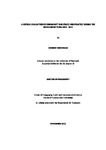A Critical Evaluation of Community Rail Policy and Practice During the New Labour Years 2003 - 2010
| dc.contributor.supervisor | Shaw, Jon | |
| dc.contributor.author | Seedhouse, Andrew Colin | |
| dc.contributor.other | School of Geography, Earth and Environmental Sciences | en_US |
| dc.date.accessioned | 2013-06-21T08:45:41Z | |
| dc.date.available | 2013-06-21T08:45:41Z | |
| dc.date.issued | 2013 | |
| dc.date.issued | 2013 | |
| dc.identifier | 284314 | en_US |
| dc.identifier.uri | http://hdl.handle.net/10026.1/1550 | |
| dc.description.abstract |
Seedhouse, Andrew Colin A Critical Evaluation Of Community Rail Policy And Practice During The New Labour Years 2003 - 2010 This thesis examines how the changing governance environments introduced under New Labour compromised or assisted the delivery of the 2004 Community Rail Development Strategy. It considers the origins of Community Rail and the circumstances which led to the adoption of the 2004 Strategy and its content. It explores the wider processes of governance change across multiple scales and the rise of a new neoliberal approach favoured by recent administrations, with particular emphasis of New Labour’s introduction of the Third Way and its creation of the third sector. The primary research aim and four core research objectives are tested within six Community Rail Partnership (CRP) case study areas, through the application of a multi-methodological approach combining desk-based quantitative analysis with qualitative semi-structured interviews of actors engaged in the case study areas and wider policy elites. For each of the case study areas, an empirical overview of the transport planning policies of actor members of the CRPs is undertaken, as well as visual and audio station audits. The research then examines the place of the 2004 Strategy within the wider transport planning policy landscape at all tiers of regional and sub-regional government, concluding a very mixed approach to engagement and support. The resurgent approach to localism and the role of New Labour’s Local Strategic Partnerships are considered in identifying existing levels of CRP engagement and opportunities to create functional spaces of engagement. It identifies a high level of correlation between current CRP activities and alignment with core performance indicators of this new governance framework, manifesting itself in a published national toolkit model. The research then examines the importance of a CRP’s own approach to governance; the role of core individuals; and the importance of actor engagement to support a stable platform for delivering successful Strategy outputs and outcomes. It concludes by recommending national policy options to improve on outcome delivery for individual CRPs and their members. | en_US |
| dc.description.sponsorship | Greater Western Research Fund Department for Transport | en_US |
| dc.language.iso | en | en_US |
| dc.publisher | University of Plymouth | en_US |
| dc.subject | Railways | |
| dc.subject | Governance | |
| dc.subject | Policy | |
| dc.subject | Community Rail | en_US |
| dc.title | A Critical Evaluation of Community Rail Policy and Practice During the New Labour Years 2003 - 2010 | en_US |
| dc.type | Thesis | |
| plymouth.version | Full version | en_US |
| dc.identifier.doi | http://dx.doi.org/10.24382/4039 |
Files in this item
This item appears in the following Collection(s)
-
01 Research Theses Main Collection
Research Theses Main


